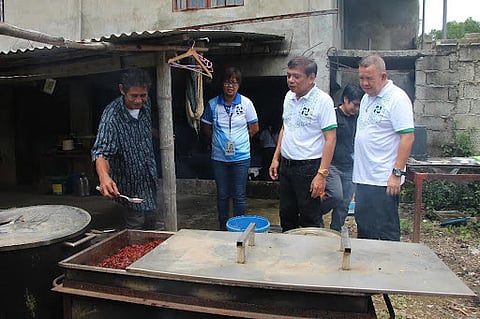
- NEWS
- the EDIT
- COMMENTARY
- BUSINESS
- LIFE
- SHOW
- ACTION
- GLOBAL GOALS
- SNAPS
- DYARYO TIRADA
- MORE

The Department of Science and Technology (DOST) is advancing two major initiatives to boost sustainable industries: eco-friendly wood stains from natural dyes and a stronger bamboo sector in Kalinga.
Through its Forest Products Research and Development Institute (DOST-FPRDI), the agency signed a Memorandum of Agreement with the Namarabar Indigo Natural Dye Producers Cooperative (NINDPC) in Abra to develop plant-based wood stains for the furniture and handicraft industries.
Forester Aralyn L. Quintos-Cortiguerra, project leader, said synthetic stains currently used in the country are often imported and contain high levels of volatile organic compounds that pose health risks. She emphasized that natural dyes provide a renewable, environmentally friendly alternative that also enhances the natural wood grain.
DOST Secretary Renato U. Solidum, Jr. described the initiative as both a “win for the planet and for people,” highlighting its potential to reduce imports while creating new opportunities for local communities.
During the launch, NINDPC demonstrated dye extraction techniques using plants such as indigo, teak, sappan, lagundi, tawa-tawa, and talisay. DOST-FPRDI Director Rico J. Cabangon said the partnership would help local industries adopt sustainable products while decreasing reliance on synthetic colorants.
Meanwhile, the agency has joined forces with the Kalinga Provincial Bamboo Industry Development Council, Kalinga State University, and DOST-Cordillera Administrative Region to expand bamboo production and processing in the province.
Speaking at the first Kalinga Bamboo Summit in Tabuk City, Solidum said bamboo can uplift communities and create jobs if backed by science-based solutions and value-adding technologies.
The two-day event showcased bamboo processing techniques, treatment methods, handicraft production, and engineered bamboo technologies. DOST-FPRDI also presented products such as the multi-functional Silyang Pinoy school furniture and its bamboo octagonal jointing system.
A memorandum of agreement was signed among several institutions, including the Department of Education–Kalinga and the Apostolic Vicariate of Tabuk, to strengthen collaboration on bamboo initiatives.
DOST-FPRDI Director Dr. Rico J. Cabangon expressed the Institute’s support to Kalinga’s bamboo industry through technical assistance, training and product testing.
“With the Institute’s interventions, we envision Kalinga emerging as a key player in the national bamboo economy, empowered by improved processing methods, value-added products, and stronger market linkages. We will be partnering with other agencies to enhance bamboo products, giving MSMEs access to a broader market and a chance to scale up their businesses,” said Cabangon.
